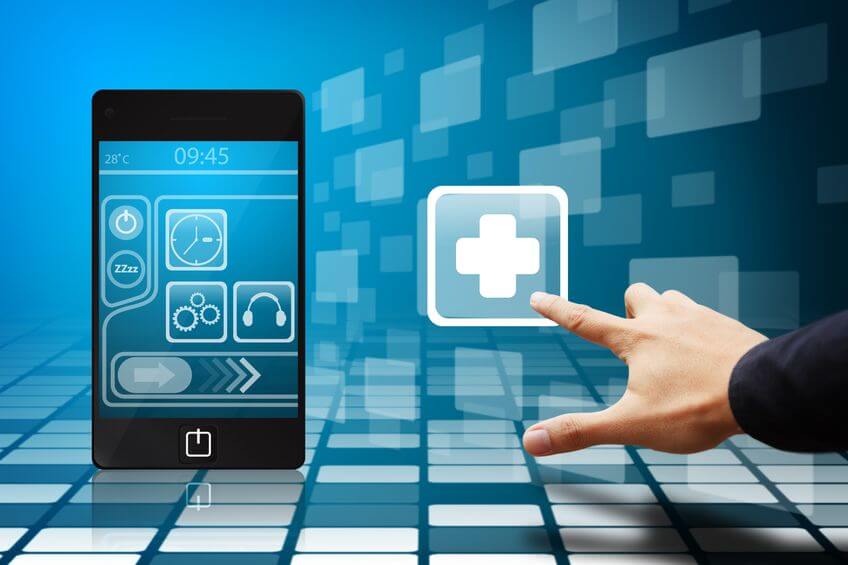Mobile phones and apps are playing an increasingly important role in our daily lives. They have enabled us to make and change plans on the go; find our ways when driving; entertain ourselves while waiting; answer questions on the spot and essentially get information and share information with the click (or swipe) of the finger.
It is estimated that there were 5.9 billion mobile subscribers worldwide in 2011, and that number is expected to grow to 7.44 billion in 20151. This year, 2012, the users of smartphones reached a billion which is 300million users more compared to the number in 20112. Rapid development of technology and the ongoing commoditization of the telecommunication market make smartphones and tablets accessible to a wider audience by the day. Consequently, the mobile phone applications industry has been booming in the past few years and the healthcare industry has been on the bandwagon since the beginning.
There is a huge and diverse range of clever health apps today that help customers (patients/people) manage the health and fitness aspects of their life: eat healthier, manage moods, manage sleep, manage prescriptions, exercise, check pollen levels in the air, record symptoms and share them with physicians without the cost of booking a physical appointment etc.3 According to Allied Health World there are currently 40,000+ medical apps available for smarthphone and tablet use and there have been 247million downloads of health apps in 2012 , which is double the number the previous year (124mil in 2011). According to the same source, 62% of mobile users have used their phones to research health information. Of those, 29% are in the 18-29 group and 18% in the 30-49 which (no surprise) shows that the younger generations are more comfortable and reliant on the online experience. Furthermore, it is estimated that 20% of online health population has posted a comment or content related to health care (which is aligned with the Pareto principle 80% listening-20% talking) but according to the same source mobile web access increases participation in the conversation. It becomes apparent that the mobile (as part of the online) experience is becoming ubiquitous.
And in case it is not implied, healthcare providers benefit as much as patients from using mobile apps: physicians are able to service patients without physically meeting with them reducing admin costs by 24%, inform decision making anywhere anytime, improve education amongst patients and students. In fact, 94% of healthcare providers believe mobile apps have the potential to improve care deliver and 60% use mobile healthcare apps for work. And according to some, the smartphone and tablet are trending to be most popular devices since the stethoscope1.
But it is not just the usefulness of these devices for the individual that makes them important. The mobile app experience has strategic relevance for healthcare (and business) systems. Recent analysis estimate that there is a worldwide shortage of 2.3 mil physicians, nurses and midwifes. In the USA there is a deficit of between 55,000 and 191,000 heatlhcare workers. You can imagine the importance of non-person related touchpoints in the healthcare experience. This of course, is not to say those healthcare workers’ roles may diminish, only that their roles and ways of interacting with the other touchpoints are likely to be redefined.
Which brings me to the final point and very relevant one: There is still some controversy surrounding the use of mobile apps and a valid debate on the risks of overreliance on technology at the expense of more lenient education, imperfect accuracy and lack of “personal touch”. Great article in the New York Times describes the debate (Redefining Medicine With Apps and iPads).
I personally believe that the human factor and technology factor are complimentary to each other (not interchangeable) and it will take learning and trial and errors to align the work of both aspects. However, customer experience in other sectors has taught us that regardless of which one you are dealing with both need to have a carefully and deliberately designed emotional experience to them. This is easily understood when you think about physicians: best ones are not only knowledgeable (rational aspect of the experience) but caring too (emotional aspect of the experience).
Mobile apps (and any smart technology) need to mimic that model. Developers and operation managers are doing a great job at perfecting the “rational aspects” of the touchpoints (e.g. greater accuracy, ease customisation, speedy response etc.). But experience design is not just about what that device can do, it is also about how it can do it. User experience architects and designers are probably familiar with the concept. What would that mean? In simple terms, ask yourself the following:
- Are we strategically considering mobile apps as part (touchpoint) of our healthcare experience? Do we recognize the role they play in our patients’ satisfaction and behaviour?
- What is the emotional reaction this touchpoint evokes?
- Does it contain features that purposefully address specific emotions in the user?
- Should it and could it contain features that purposefully address specific emotions in the user?
Healthcare providers should be recognizing by now that mobile apps ARE in fact part of the experience they deliver like it or not. If they cannot directly control the experience in that touchpoint, they should at least consider its effect on the overall customer (patient) behaviour and attitude. That way, they can at least manage the effects better.
- http://healthworkscollective.com/sites/healthworkscollective.com/files/mHealth.jpg
- http://www.ibtimes.com/worldwide-smartphone-users-cross-1-billion-mark-report-847769
- http://www.happerture.com/wp-content/uploads/2012/06/HealthcareAndMobileInfographic1.jpg
- http://media-cache-ec4.pinterest.com/upload/268527196503391075_T64DYUxk_c.jpg
| Kalina Janevska , Kalina Janevska is a Consultant at Beyond Philosophy one of the world’s first organizations devoted to customer experience. Kalina is a chief experience modeller and designer with deep applied knowledge of CE in healthcare, retail and developing economies. Beyond Philosophy provide consulting, specialised research & training from offices in Atlanta, Georgia and London, England. Follow Kalina Jenevska @Kalina_BeyondP. |


